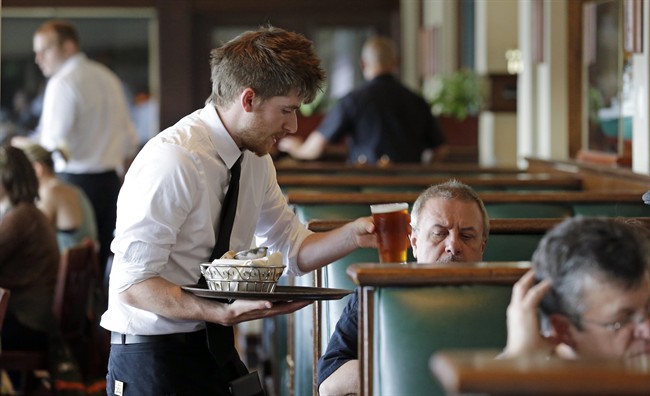Seattle is making its way toward $15 an hour minimum wage, and new duelling research argues that it’s both killing low-wage jobs and having no negative impact at all.

The swift pay hike in the city to $13 an hour — a scheduled step toward the $15 minimum — resulted in low-wage workers actually making less money, argues a new University of Washington report.
READ MORE: Average hourly wages in Canada have barely budged in 40 years
Researchers said that, on average, while wages for the lowest income earners in Seattle did increase, workers hours were cut by nine per cent. As a result, the city’s low-wage workers made $125 less per month.
The study’s authors suggest that Seattle’s wage hikes were too much, too soon.
“There is good reason to believe that increasing the minimum wage above some level is likely to cause greater employment losses than increases at lower levels,” the study states.
However, a report from the University of California, Berkeley, released on “Seattle’s groundbreaking minimum wage law” stated the opposite.
“Seattle’s minimum wage law is working as intended, raising pay for low-wage workers, without negatively affecting jobs,” said prof. Michael Reich, lead author of the report in a release.
READ MORE: Reality check: Is a $15 minimum wage bad for the economy?
While the Berkeley report only examined restaurant jobs, the study authors note the sector is “an intense user of minimum wage workers; if wage and employment effects occur, they should be detectable in this industry.”
Both Ontario and Alberta are phasing in $15 an hour minimum wage over the next few years, and the policy has been floated for British Columbia.
Canadians, just like experts over the years, have been equally split over how the pay hikes will play out.
WATCH: Would a $15 per hour minimum wage force companies to lay people off?

“There are hundreds of studies,” said Ian Lee, associate professor at Carleton University’s Sprott School of Business. “The majority of the research found that there is a negative impact to raising the minimum wage.”
That is often nuanced by the speed at which the wages increase and if you’re looking at small family business opposed to a massive corporation.
Lee says the University of Washington’s research appears to be more “methodologically sophisticated,” than the Berkeley study.
Along with a movement toward higher minimum wages, Lee says, automation continues to swallow up entry level jobs, meaning more automated check-out counters and kiosks.
“I think that the impact falls much more heavily on small business than large business,” said Lee. “Large businesses are more able to absorb the costs of the minimum was increased than a small business, and I think that there are impacts in the sense that it encourages or motivates business to spend more on automation to displace labour.”
READ MORE: Will you be replaced by a robot? A look at what jobs are going to the bots
The cost of labour, like anything else, impacts the demand for it, says Lee.
“Surely there is some tipping point, where if you raise the cost of anything it causes a change in the demand of consumers for that product,” said Lee.
A loss of work for some low-wage employees really shouldn’t come as a surprise, said Jacob Vigdor, professor of public policy at the University of Washington and director of the team studying the increase, told Reuters.
“Most people will tell you there is a level of minimum wage that is too high,” said Vigdor. “There is a sense that as you raise it too high, then you get to a point where employers will really start cutting back.”
Still, Seattle’s mayor stands by the decision to raise the minimum wage for all workers in the city.
“Raising the minimum wage helps ensure more people who live and work in Seattle can share in our city’s success, and helps fight income inequality,” Seattle Mayor Ed Murray said in a statement in response to the study, which the city commissioned.
Canadian policy makers have voiced similar sentiment.
READ MORE: Canada sees slowest wage growth since 1997
“Millions of workers in Ontario are finding it almost impossible to support their families on a minimum wage that just doesn’t go far enough,” said Ontario Premier Kathleen Wynne in a release announcing the province’s incremental wage hikes to $15 per hour.
“Raising the minimum wage is about creating a fairer, more equal society where everyone gets to share in our province’s economic growth.”

Alberta has stressed the importance of a well-laid out plan for the wage increases.
“One of the things we heard strongly from many of the stakeholders, including business, was the desire for certainty, to know what was coming,” said Alberta Labour Minister Christina Gray last fall.
“We are committed to supporting to our low-wage Albertans, people who are working full-time jobs and are still not able to make ends meet,” said Gray.
All workers in Alberta will be paid $15 an hour by 2018, and in Ontario by 2019.
— With files by Reuters and the Canadian Press









Comments